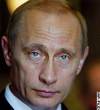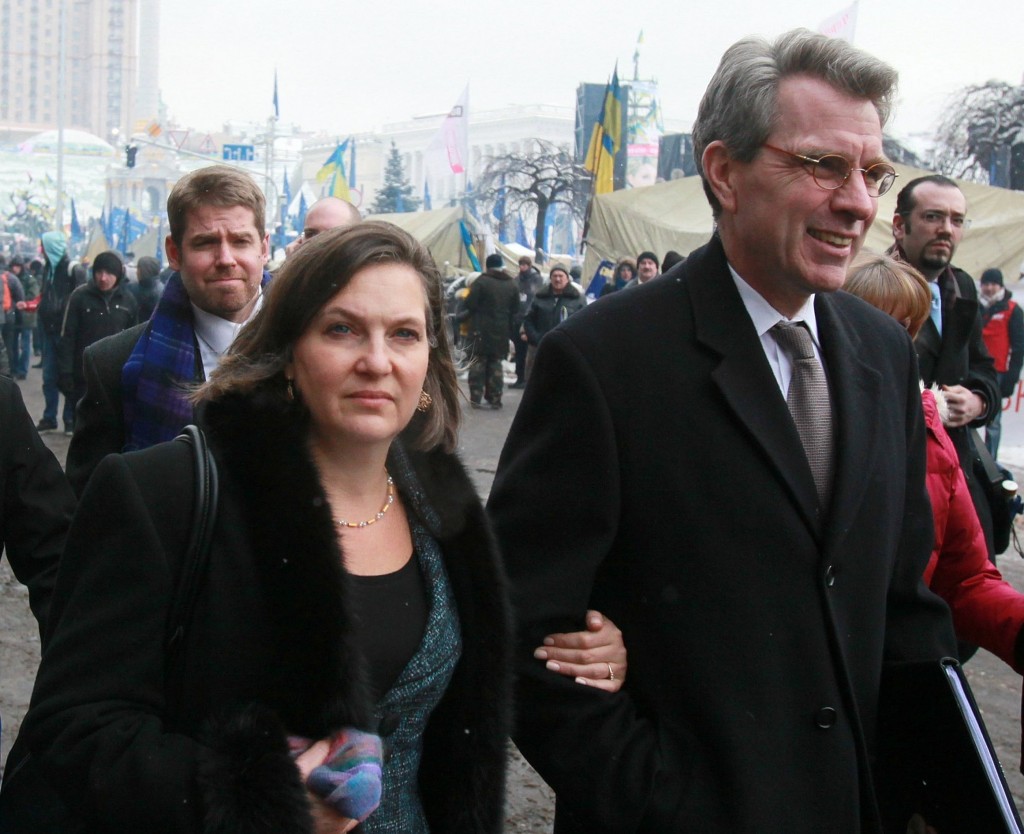“Unfriendly Relations” with Russia, American Imperialism and the Dangers of Nuclear War: Trump and the Wolfowitz Doctrine

As President Trump affirms publicly his commitment to friendly relations with Russia at an economic summit in Hanoi, (the first President since Franklin Roosevelt to do so), the press backs the special prosecutor seeking to indict him, while NATO continues to ramp up its forces on Russia’s borders with Europe by bringing in tanks and other ‘defensive’ weapons.
Although the United States was founded on Christian principles, and has one of the highest percentages of people practicing a religion of any Western country, most Americans seem not to realize that their country is building a case for nuclear war with the other major nuclear power. Until recently, Americans believed that while nuclear weapons were a necessary evil — because our enemies had them — every effort should be made to avoid using them. Now, Russian ‘behavior’ in its own back yard is seen as justifying an American attack, the inevitable use of nukes merely a slight detour on the path of human progress.
Has Russia done anything that even comes close to war-ranting talk of war?
Its two alleged sins are ‘invading’ Ukraine and ‘interfering’ in a sacred American exercise.
Interestingly, rather than using the word ‘election’, the beltway refers to Russia’s internet capers as ‘interfering in our Democracy’. Ever since the highest court baptized corporations as people, allowing them to spend unlimited money to help their candidates win elections, democracy has been spelled with a capital D, the media breathlessly zeroing in on the amounts candidates raise, rather than on the ideas they espouse. Vladimir Putin’s sin is not to have drawn a sword.
These accusations only work because Americans were taught to regard Russia as an ‘evil empire’ for having embraced a political philosophy intended to ensure the well-being of the 99%, (whether or not it succeeded). When, after seventy years, it executed a stunning turnaround, allowing capitalism to flourish (creating a lot of crooks and billionaires in the process), American policymakers could have applauded. Instead, Washington began building a case for confrontation.
 The rationale behind this behavior is Washington’s stated plan to carve up the world’s largest country into loyal fiefdoms to ensure continuing American world hegemony. I’ve mentioned the Wolfowitz Doctrine before, but until it becomes mandatory high school reading, Americans will believe congressional and special investigations are necessary as a prelude to war.
The rationale behind this behavior is Washington’s stated plan to carve up the world’s largest country into loyal fiefdoms to ensure continuing American world hegemony. I’ve mentioned the Wolfowitz Doctrine before, but until it becomes mandatory high school reading, Americans will believe congressional and special investigations are necessary as a prelude to war.
Drafted in 1992, a year after the Soviet Union imploded, by Under Secretary of Defense for Policy Paul Wolfowitz (image right) and never superseded, under the humdrum title of Defense Planning Guidance, its purpose was and is
“to prevent the re-emergence of a new rival, either on the territory of the former Soviet Union or elsewhere, that poses a threat on the order of that posed formerly by the Soviet Union. This is a dominant consideration underlying the new regional defense strategy and requires that we endeavor to prevent any hostile power from dominating a region whose resources would, under consolidated control, be sufficient to generate global power.” (emphasis added)
 The notion of an imperial presidency did not do justice to this set of detailed policy recommendations intended to ensure that no country is ever able to challenge American hegemony. When it was leaked to the New York Times, Senator Edward Kennedy described its recommendation of pre-emptive military action to prevent any other nation from rising to superpower status as “a call for 21st century American imperialism that no other nation can or should accept.” Confronted with widespread condemnation, the document was rewritten in softer language, and when the US invaded Iraq and Afghanistan – neither of which could possibly challenge American hegemony – it became known as the Bush doctrine.
The notion of an imperial presidency did not do justice to this set of detailed policy recommendations intended to ensure that no country is ever able to challenge American hegemony. When it was leaked to the New York Times, Senator Edward Kennedy described its recommendation of pre-emptive military action to prevent any other nation from rising to superpower status as “a call for 21st century American imperialism that no other nation can or should accept.” Confronted with widespread condemnation, the document was rewritten in softer language, and when the US invaded Iraq and Afghanistan – neither of which could possibly challenge American hegemony – it became known as the Bush doctrine.
Continued uninterruptedly at the cost of thousands of American, and especially foreign lives, some might see in it echoes of Hitler’s plan for a thousand year Reich, but sadly, most Americans believe their country is merely — and generously! —exercising ‘benevolent oversight’ over an innocent ‘rules-based’ order. As rewritten, the Defense Planning Guidance lays out pious aspirations:
“Our most fundamental goal is to deter or defeat attack from whatever source… The second goal is to strengthen and extend the system of defense arrangements that binds democratic and like-minded nations together in common defense against aggression, build habits of cooperation, avoid the re-nationalization of security policies, and provide security at lower costs and with lower risks for all. Our preference for a collective response to preclude threats or, if necessary, to deal with them is a key feature of our regional defense strategy. The third goal is to preclude any hostile power from dominating a region critical to our interests, and also thereby to strengthen the barriers against the re-emergence of a global threat to the interests of the U.S. and our allies.”
No matter how it is couched, the Wolfowitz Doctrine is the twenty-year old foreign policy guide that Donald Trump’s ‘naive’ foreign policy goals challenge, provoking a no holds barred assault by those who helped him get elected. Americans are aware of the Authorization for the Use of Force (AUF) which theoretically has to be voted by Congress for the US to be able to attack another country, but they lack the key tool to make sense of US foreign policy.
 Although Russia and China are the only countries capable of challenging US dominance, they have made no threats. To understand Washington’s seeming obsession with preventing it ever happening, we need to back up to 2007. In a landmark speech to the 2007 Munich International Security Conference, Vladimir Putin advocated an international architecture in which the four or five regional powers would cooperate on the international stage to ensure peace and prosperity for all. Since any form of power-sharing contradicts the Wolfowitz doctrine, the US responded by fomenting a series of color revolutions, starting with Georgia in 2008, then Ukraine in 2014 aimed at eventually carving up Russia itself that dared propose such a thing into obedient fiefdoms, presumably before taking on the other major power, China.
Although Russia and China are the only countries capable of challenging US dominance, they have made no threats. To understand Washington’s seeming obsession with preventing it ever happening, we need to back up to 2007. In a landmark speech to the 2007 Munich International Security Conference, Vladimir Putin advocated an international architecture in which the four or five regional powers would cooperate on the international stage to ensure peace and prosperity for all. Since any form of power-sharing contradicts the Wolfowitz doctrine, the US responded by fomenting a series of color revolutions, starting with Georgia in 2008, then Ukraine in 2014 aimed at eventually carving up Russia itself that dared propose such a thing into obedient fiefdoms, presumably before taking on the other major power, China.
In 2014, NPR broadcast a discussion between Russia’s Defense Minister, Sergei Shoigu, and journalist Corey Flintoff, in which the Russian says:
“The socioeconomic problems of some countries are used as an e cuse to replace nationally-oriented governments with regimes controlled from abroad. Those regimes provide their patrons with unimpeded access to these countries’ resources…”
This suggests that President Putin was well aware of the Wolfowitz doctrine when the US assiduously backed the ‘freedom fighters’ in Kiev’s Maidan Square, who eventually overthrew the pro-Russian president, Victor Yanukovich (whose image Paul Manafort was paid to polish…).
Washington was not concerned by the leading role played by private, far-right militias who worship the memory of nationalist Stepan Bandera, who fought with the Nazis in World War II, expecting a victorious Hitler to grant Ukraine independence from the Soviet Union.
Neo-Nazi March in Kiev, portrait of Bandera
In fact, Clinton’s Assistant Secretary of State for Eastern European Affairs, Victoria Nuland, personally kept up the rebellion’s morale by handing out cookies in the Maidan encampments. When Yanukovich was forced to flee for his life, she chose his successor in consultation with then American Ambassador to Ukraine, Geoffrey Pyatt, in a telephone conversa-tion which can be found on the web.
Nuland and Pyatt in Kiev
Here we must back up to Ukraine’s tragic history as part of a changing set of entities that included some or all of its neighbors, Russia, Poland and the Baltic states, only achieving independence between 1917 and 1921. Ukraine’s nationalist aspirations continue to take precedence over any repugnance its people might feel vis a vis the Neo-Nazi militias, who in fact took over security after the 2014 coup. Attitudes are very different, however, among the Russian-speaking population located in the east of the country along the Russian border. Unbeknownst to most Americans, the Soviet Union lost 26 million people in repelling Hitler from its territory and liberating Eastern Europe. So when the coup government in Kiev removed equal status for the Russian language, referring to Russians as ‘cockroaches’, the inhabitants of Donetsk and Lugansk took up arms.
They would have preferred to rejoin the mother country, but President Putin, who has a degree in international law, made clear that this was not going to happen. Instead, he backed their demands for significant local autonomy, helping the peoples’ militias resist attacks by Kiev’s troops. True to the Wolfowitz playbook, President Obama accused him of ‘invading’ his neighbor, acting ‘as though might makes right’..
“Wolfowitz” attributes even greater importance to events in Crimea. As in Eastern Ukraine, ninety percent of the peninsula’s inhabitants are also Russians, but the context is different: Russia cannot afford to lose its one warm water naval base, built by Catherine the Great in Sebastopol, so Putin organized a referendum, knowing Crimeans would vote overwhelmingly to rejoin the mother country. In fact, Crimea had always been part of Russia until in 1954, Khruschev gifted it to Ukraine. Currently, the Duma is discussing a bill that would rescind Khruschev’s decision, eliminating the peg upon which the US hangs its accusations of Russian illegality.
(Among the more than 800 American military bases worldwide, twelve are in tiny South Korea, while only three Russian bases are located outside the borders of the Commonwealth of independent States, which replaced the Soviet Union. These consist of one air base and one port in Syria and a naval resupply facility in Vietnam.)
Under these circumstances and as a man committed to making deals rather than wars, candidate Trump announced his desire to improve relations with Russia, approved by a public that has long since forgotten the Wolfowitz Doctrine. However, for Washington bureaucrats, who remain the same from one president to the next, Wolfowitz remains the law of the land, and trips to Moscow that could be construed as ‘political’ were criminal. Russia having gone from being ‘foreign’ to ‘adversary’ to ‘enemy’ on the basis of its so-called ‘invasion’ of Ukraine, American citizens are required to signal any encounter with Russians to the FBI! Saudi Arabia can bomb tiny Yemen to smithereens, in the biggest ethnic cleansing ever, but talking to Russians can land you in jail.
Relations between Obama and Putin, and even more so, between Hillary Clinton and the Russian President, were already so bad even before the election, that the US media accused the Russian President of purposely introducing a large dog into one of their meetings, knowing that Hillary fears canines. (Putin shows off his dogs the way Trump shows off his Mandarin-singing granddaughter, but according to the Kremlin, when he noticed Hillary’s discomfort, he apologized and dismissed the dog.)
Such ‘unverifiables’ litter the US/Russia relationship, but Hillary’s fear of dogs is by far more credible than is Russia’s ‘invasion’ of Ukraine. Had it actually occurred, Kiev would have fallen in twenty-four hours. And yet, Paul Manafort’s scrubbing from the Republican presidential platform of a promise to provide weapons to Kiev, is condemned as favoring Russia rather than as depriving a Neo-Nazi regime of the means to kill its own citizens.
In the end, Russiagate is just another example of America’s fairytale foreign policy: are Muslim militias, whether Hezbollah or Hamas, ‘terrorists’, or patriotic challenges to plans for a greater Israel?
As we witness the suspicious resignation of Lebanon’s Prime Minister via television from the Saudi capital, the reputation of the Saudi’s nemesis, Iran — which has not attacked another country in three hundred years, should depend upon the answer to that question. However, Americans are constantly reminded that during its 1979 revolution, Iran held fifty-two US Embassy staff hostage for 444 days! Unmentioned is the fact that its revolution was in response to the situation created twenty-six years earlier, when the US carried out a coup against the elected government that was about to nationalize Iran’s oil, replacing him with the Shah, who gave us the oil and ruled with an iron fist.
(Iran and Russia have long been allies, but because America’s political elite cannot imagine that the relationship is based on shared values, it thinks it can drive a wedge between them. A similar delusion applies to the Iran nuclear deal: to their credit, our European allies have warned the US that it cannot unilaterally abandon the agreement because the Western signatories are indivisible.)
Whether or not one applauds the election of Donald Trump, it should be obvious that if the nuclear great powers do not maintain friendly relations, the future of mankind is in jeopardy.
Why should Russia’s ‘behavior’ in its own back yard justify plans for war?
Why, instead of handing out medals to those who reached out to Russia, are we threatening to ruin their lives?
Why do those who hope that President Trump will not challenge North Korea to a nuclear exchange not also worry about the missiles we installed in Europe, to be launched against Russia in the event that it were to ‘invade’ the tiny Baltic countries to defend their Russian minorities? (This could conceivably happen were we to also install Neo-fascist regimes in Lithuania, Latvia and Estonia, as the next step in trying to separate Russia from its ‘near abroad…..)
As long as the regime we installed in Kiev could be seen as merely ‘tolerating’ torchlight marches by far-right militias proclaiming their allegiance to Hitler ally Stepan Bandera, the media could ignore it (between visits by the likes of Senator John McCain).
 Just recently, however, President Poroshenko’s (image right) government promoted the worst pages in Ukraine’s history with a statue of a leader who oversaw the killing of thousands of Jews before Hitler came to power. Symon Petliura is sculpted sitting on a bench with papers in his hand, as if he were a thinker rather than a mass murderer, as Kiev continues to be an ‘inspiration’ for far-right political parties winning elections across Europe.
Just recently, however, President Poroshenko’s (image right) government promoted the worst pages in Ukraine’s history with a statue of a leader who oversaw the killing of thousands of Jews before Hitler came to power. Symon Petliura is sculpted sitting on a bench with papers in his hand, as if he were a thinker rather than a mass murderer, as Kiev continues to be an ‘inspiration’ for far-right political parties winning elections across Europe.
Meanwhile, American citizens can only watch, powerless, as the country that founded the United Nations envisions destroying significant parts of the world in order to continue dominating what remains — in the name of its exceptionalism.
Philadelphian Deena Stryker studied in Paris, became a French citizen by marriage, debuted at Agence France Presse in Rome, then, as Deena Boyer, followed Fellini’s creative process for The Two Hundred Days of ’81/2’. The proceeds from this book enabled her to interview Fidel Castro for a major French weekly, meeting with him again a week after the Kennedy assassination and several times in 1964 for a book, Cuba 1964: when the Revolution was Young in which the other members of the government (including Che Guevara, Raul Castro and Celia Sanchez), tell in their own words why they made the revolution. Her Cuba archive is on-line at Duke University.



